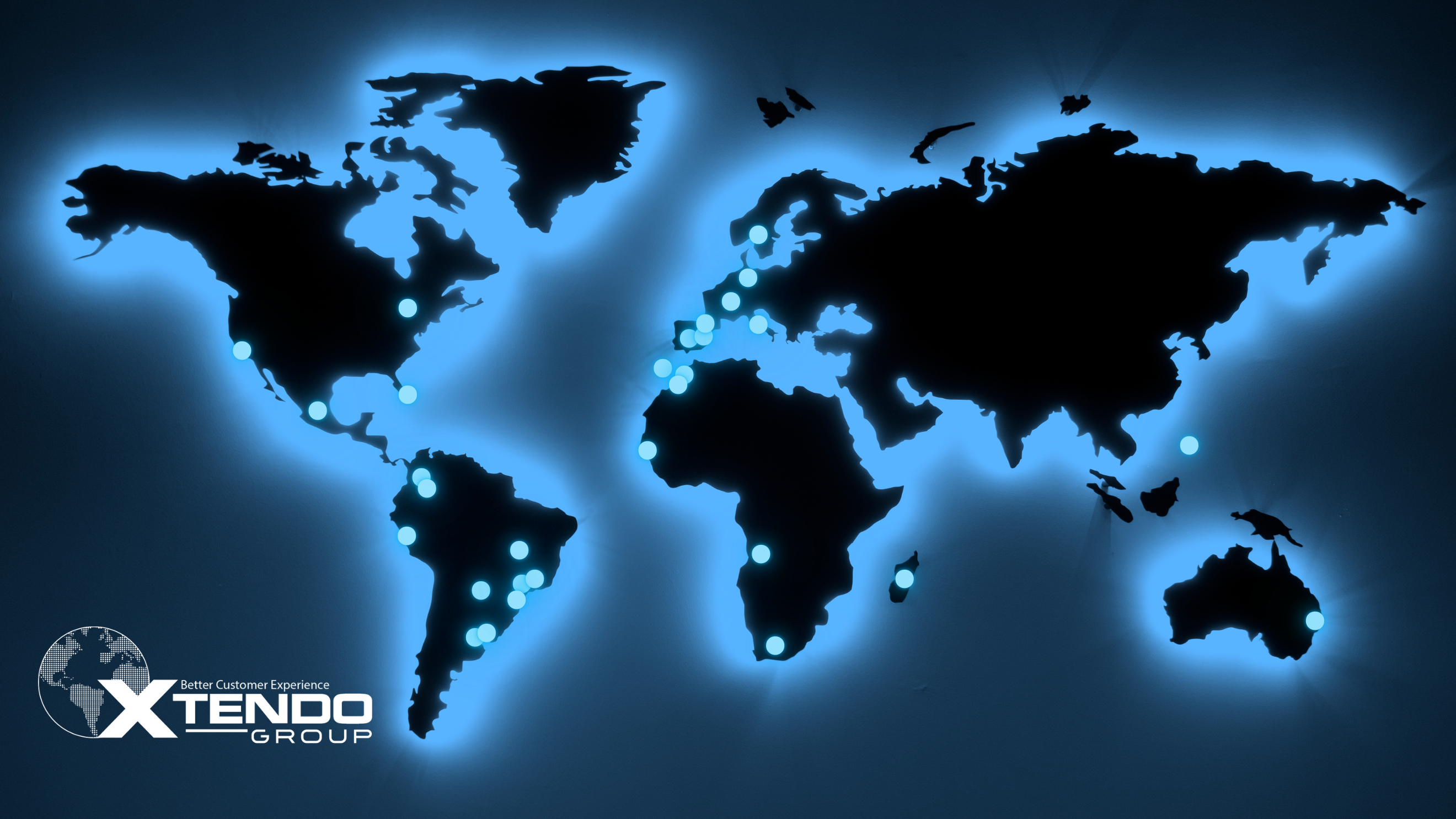And provides better service continuity than your competition.
In today’s business world, the only sure thing is change. In the last five years, we have experienced a succession of disruptive events: pandemics, geopolitical conflicts, natural disasters, economic crises and cyber-attacks. This volatile environment has shown that having geographically concentrated call center locations is neither sustainable nor competitive over time.
At Xtendo, since 2008, many years before the pandemic, we have envisioned and implemented a “Talent without borders” strategy, which enables our teams to work remotely from various regions of the world. This model not only enriches human resource diversity and capability, but also mitigates operational risks, enhances business continuity, crisis resilience and protects business profitability.
“Xtendo is a key strategic partner for Pedidos Ya. Its 100% remote management model has allowed us to achieve greater flexibility and agility in response, along with excellent results. From the outset, it provided us with a significant differential in terms of experience, compared to the traditional face-to-face management model. We particularly appreciate the opportunities offered by this “talent without borders” approach, which allows us to integrate professionals from different regions, committed to providing an exceptional experience in every interaction with our clients. Carolina D’Annunzio, VMO-QTK Sr Manager Pedidos Ya
An interconnected and ever-changing world
Globalization and digitization have profoundly transformed the way businesses operate. But this interdependence has also exposed organizations to multiple vulnerabilities:
- Political and regulatory risks: Changes in government policies can affect your operations and supply chain.
- Climate risks and natural disasters: Hurricanes, earthquakes and floods disrupt key activities.
- Infrastructure risks: Power outages and connectivity failures can bring your services to a complete standstill.
- Security and conflict risks: War or social scenarios can put your staff at risk and severely affect continuity.
- Talent risks: Concentrating your teams in one region limits your access to skills and capabilities, and can also reduce productivity, increase turnover and hinder recruitment times.
- Health risks: The COVID-19 pandemic demonstrated how a health crisis can disrupt operations globally.
Geographic concentration as an operational vulnerability
Many companies still operate under a centralized model, without taking into account the risks involved. This geographic concentration represents a serious threat when faced with unpredictable contexts:

- Operational disruptions due to technical, infrastructure or cybersecurity problems: a single adverse event can bring operations to a complete halt. On April 28, 2025, a massive blackout affected Spain, Portugal and parts of southern France, leaving more than 50 million people without electricity.
The power outage disabled telecommunications networks, paralyzed transportation systems and affected essential services such as hospitals and emergency services. The recovery of the power supply was gradual, extending until the early morning of April 29. (CNN en Español)
- Limitations in access to diversity and talent capacity: The lack of diversity in work teams can limit the innovation and adaptability of companies. According to a McKinsey study, companies with greater ethnic and cultural diversity in their teams are 36% more likely to outperform their competitors in profitability. (Vorecol Recruiting)
- Staffing issues: Strikes and work stoppages in contact centers reflect significant staff management tensions. For example, in April 2025, a large majority of Jazzplat’s 1,100-strong workforce supported the CCOO’s work stoppages, highlighting the extent of labor unrest.(DCLM.ES)
- High costs: Interruptions in critical services can have a significant cost. In the telecommunications sector, more than a third of companies reported that outages in critical business applications cost more than $500,000 per hour, and nearly a quarter estimated losses in excess of $1 million per hour.(Yahoo News)
Adapt and diversify: from strategy to urgency
Companies that fail to adapt risk losing competitiveness, reputation and money. Diversification of talent and decentralization of operations are not a fad, but a strategic necessity:
- Loss of competitiveness: your more agile competitors build customer loyalty and adapt quickly. A poor customer experience can translate into a significant loss of customers and thus market share. Recent studies reveal that up to 74% of consumers are willing to switch providers after a poor customer service experience. In addition, 86% of consumers will abandon a brand they trusted after just two bad experiences. (cxscoop + emplifi)
- Financial impact: Every minute of disruption has a considerable economic cost. The latest ITIC study shows that the cost per hour of downtime exceeds $300,000 for 91% of SMEs and large companies. (ITIC Corp)
- Demotivation of talent: The abrupt elimination of teleworking can generate a deep demotivation among employees, affecting their commitment and productivity. An illustrative case is that of the Spanish company Holaluz, which in February 2025 decided to eliminate remote work and return to a 100% face-to-face model. This measure led to the resignation of more than 25% of its workforce, i.e. more than 50 employees, and triggered an indefinite strike led by the trade unions UGT and CGT. The company’s lack of communication and clear justification intensified the unrest, demonstrating how rigid labor policies can deteriorate team morale and compromise operational stability (Infobae).
Xtendo and the “Talent without borders” model
At Xtendo, we developed an operating model based on globally distributed remote teams, offering real solutions to our clients’ most pressing challenges.
“Our BPO clients often tell us that they are concerned about the high risks they are exposed to due to the geographic concentration of their call centers, as well as the higher turnover of resources due to people’s resistance to return to the face-to-face model, and additionally the increasing building costs. In this context, providing BPO teams working remotely from different continents of the world has allowed us to provide quick and successful solutions to these sensitive points”, Martin Barbero, CEO & Founder of Xtendo Group.

What do we achieve with this strategy?
- Access to global talent: We choose the best professionals without geographical limitations.
“Xtendo is more than remote work; it is the freedom to grow without limits, to connect with the world from anywhere and to expand horizons in diverse countries and languages. Here, my talent finds room to evolve and every day is an opportunity to reinvent myself.” Stefanny Ramírez Cañón, QTK Manager
- Extended time coverage: By operating in multiple time zones, we ensure continuous attention and availability, both in nearshore and offshore schemes.
“The best thing is knowing that, wherever you are from, we can continue working with peace of mind. Our model means that distance is not an obstacle, but an advantage: everything is designed so that nothing slows us down.” Matias De Zan, Sr Teams Management
- Greater operational resilience: geographic diversification protects against local disruptions, and mitigates the risks of customer service outages.
“Xtendo: A strategic partner that guarantees resilience and peace of mind in the face of any challenge; trust and support are the basis of our mutual success. Security and operational continuity are more than a promise, they are our reality.” Claudia Patricia Escobar, Team Manager
- Flexibility and team satisfaction: We create adaptable work environments, with higher engagement and talent retention.
- Xtendo has an average of 17.5% less staff turnover than the industry, being only 4.95% monthly.
- And 40% of staff have an average tenure of +2 years.
“My experience working remotely at Xtendo has been really rewarding. Here I found a place where I could grow, contribute and feel part of a team that embraces diversity and values genuine commitment.”, Jessica Mendoza, Senior Workforce Manager
“Being part of Xtendo means for me a constant process of evolution, learning and expansion of horizons, in an environment that drives development with purpose.” Diana Marcela Cardona ,Senior Payroll Analyst & Software Accounts Management
- Reduced operating costs: We significantly reduced fixed expenses in physical offices.
- Rapid scalability: We adjust the teams with flexibility and agility according to the client’s demands.
Measurable results:
Projects implemented by Xtendo BPO applying the telework model in Customer Experience and Contact Center services for companies such as Microsoft, PedidosYa, and Supermercados Tottus, have shown the following:
- PedidosYa contracts Xtendo for Customer Service, logistics tracking and content moderation solutions, covering around 36 lines of business. Staff turnover has been stable for years at values below 5% per month, directly and positively impacting operational indicators
- With Tottus we not only trained and activated the initial team in 3 days, but also substantially improved response times and optimized Call Center hourly costs, reducing them by 24% in Chile, directly impacting customer loyalty in just 3 months.
- Microsoft, by outsourcing with Xtendo, achieved an increase of 56.25% in the annual turnover of the campaign oriented to SMEs, +20 times return on marketing investment, generating 1904 Leads in 12 months with a closing rate of 22%.
In addition to our BPO solutions, we also have a model that combines Generative Artificial Intelligence with human warmth: 2X Agent. This Xtendo solution integrates human agents with generative AI-powered virtual assistants, offering 24/7 customer service that is efficient and empathetic. With 2X Agent, companies can respond to each customer in real time, increasing lead conversion rate by up to 21 times, without compromising service quality. This combination of technology and human touch not only improves operational efficiency, but also elevates customer satisfaction, positioning companies at the forefront of customer experience.
- +550,000 cases handled per month at Interbank, with the 24×7 availability of our omnichannel solution.
- 59% reduction in Caixa Federal’s customer service costs, with Xtendo’s Generative Artificial Intelligence Agents solution.
Global Presence: Real Coverage

We develop teams strategically distributed in different countries around the world:
- America: Colombia, Peru, Uruguay, Paraguay, Argentina, Brazil, Mexico, Guatemala, USA, Canada.
- Europe: Spain, Italy, France, Germany, Norway, Eastern Europe.
- Asia and Oceania: Philippines, India, Australia.
- Africa: Angola, Cape Verde, Madagascar, South Africa, Morocco.
This geographical distribution guarantees a resilient, continuous and flexible operation, adapted to the specific needs of each customer.
In conclusion: To Diversify and Distribute is to Win
In an environment where the only constant is uncertainty, diversifying your talent and adopting distributed operating models is not an option, it is a key competitive advantage.
Xtendo’s “Talent Without Borders” model not only solves today’s challenges, but prepares your company to anticipate and thrive in the face of future disruptions, and gain substantial advantages over your competition.
The recent widespread outage in Spain, Portugal and southern France made this clear. The question is no longer if you should diversify, but when. And the answer is: Now.
Jackie Palma, Growth Marketing Manager – Xtendo BPO

